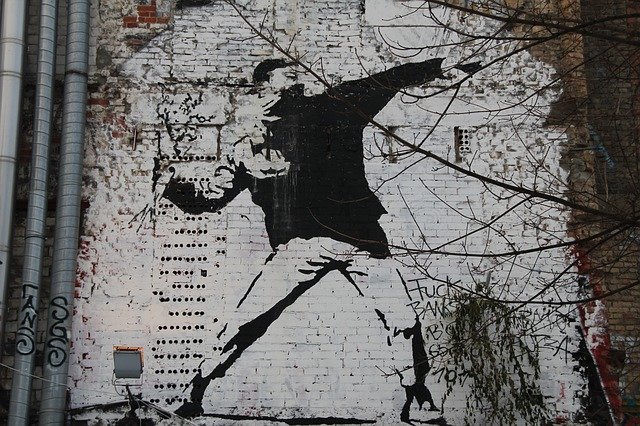
When most everyday people hear the word "anarchy", they think of Molotov-cocktail-throwing rioters burning things in the streets. What the word actually means is "without archons" or "no rulers." It has a varied history, to be sure. Some see it as a fight against capitalism, others as the removal of all forms of hierarchy, still others (more recently) think of it in terms of the removal of coercion in favor of voluntary exchange.
That's the interesting thing about language. It changes over time and represents different symbols to different people. For me, anarchy and voluntaryism correlate nicely with what I've come to think may be the closest thing to universal morality yet: the Non-Aggression Principle or NAP. There are criticisms, to be sure, and it probably won't solve the trolly problem any time soon (short of tying up the bastard who keeps tying people up to train tracks).
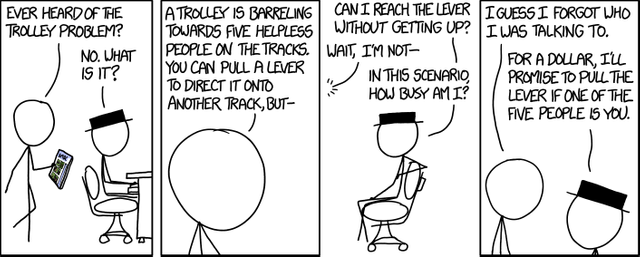
via xkcd
(don't be like this guy)
But the NAP does give us a framework for peaceful interaction by invaliding the initiation of force and honoring our rights to own ourselves in the moment (liberty), ourselves in the past (property), and ourselves in the future (life).
The biggest violation of the NAP (and anarchy in general) comes about when humans believe in and follow authority. I'm not talking about an earned, voluntary authority like "Michael Jordan is an authority on the game of basketball," but more of a positional, hierarchical authority involving coercive power over others, initiated with no moral justification. When we think about this form of authority, the obvious example of government comes to mind. Some see government as the monopoly on the use of force within a geographic region. I take it a bit further and say it also has a monopoly on currency creation, defense, law, and justice. As with most unnatural monopolies, I think it distorts voluntary exchange which leads to poor service through the lack of competition.
Many agree with Thomas Hobbes and argue for a Leviathan to keep our "evil" human nature in check. I personally think we can and should move beyond the ideas written over 350 years ago and recognize how many of us are loving, compassionate, and empathetic. As a species, we no longer put cats in bags and burn them for entertainment. Today we have technologies like the blockchain which enable a peaceful, decentralized approach to human society. We no longer have to follow the standard programming from birth to death which reinforces primitive needs to find the alpha and follow them for safety and survival. People are starting to wake up to the failures of the Prussian model of education which teach children to stay in line and follow orders (we're no longer a nation of factory workers after all). The Internet has removed the gatekeepers of knowledge, freeing us from the myth that we require rulers in order to thrive.
If you're curious about this line of thinking, I want to highlight two books for your consideration. The first is The Most Dangerous Superstition by Larken Rose.
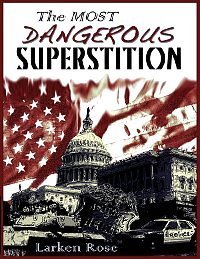
Which you can find on Amazon here.
The second is Freedom by Adam Kokesh.
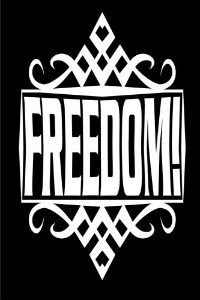
Available on Amazon here and as an audio book on YouTube.
Adam's book may be a little easier to digest, but maybe I feel that way because I read Larken's book first.
Freedom, liberty, and escaping from oppression are very important aspects of our quest for well-being. All around us we see government becoming more of a joke than a solution while the private sector innovates with new creations like Steemit. As many have talked about already, Steemit has the potential to revolutionize how society functions because it can create support for a currency not backed by force, but by code.
As a species, it's time for us to start growing up. Positional, unearned authority is not only corrosive to freedom, but it's dangerous and destructive. Unfortunately, our primitive, follow-the-leader pack mentality isn't easy to overcome. I see it here on Steemit as well when people pander to whales or cry out for the "admins" to "do something" about whatever problem they see. With cryptocurrencies and Steemit, there is no centralized authority. Not even steemit.com is centralized now that the code is open source. The witnesses and miners work together via non-coercive consensus in their own self-interests which represent the interests of the majority on the network.
This is a truly beautiful and unique time in history where decentralization on a mass scale is actually more efficient than centralization. We no longer have to follow our primitive instincts backed by fear or doubt.
We Are No Longer In a Cage
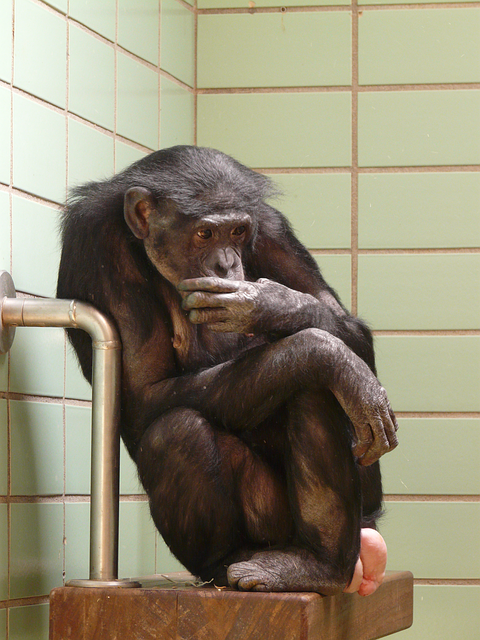
It's time to escape the cage of our own thinking. We're the adults now, and it's time to act like it. Mommy and daddy are no longer the authority on what is right and what is wrong. That's up to us to figure out. There is no one who will "fix" society but us. The belief in authority is a myth, a mass delusion. No human has a right to rule over another human, and no one can delegate to others rights they don't have themselves.
The future is what we make of it.
If you're more of an audio-visual learner like me, please check out this video on the philosophy of liberty (8 minutes):
Thanks for reading. I'd love to hear your thoughts in the comments below.
Great post! I think it's worth pointing out that the Hobbesian "nasty, brutish and short" conception of humanity is not simply anachronistic -- it's blatantly wrong , and increasingly contradicted as we learn more about human evolution. You can see glimpses of this even in the writings of Kropotkin and more modern conceptions of our cooperative evolution. I've recommended it before, but I highly recommend reading Matt Ridley's "The Origins of Virtue" -- a good popsci summary of this stuff that encompasses the best of Dawkins' selfish gene stuff (and more).
Downvoting a post can decrease pending rewards and make it less visible. Common reasons:
Submit
What's up @cwage! Great to see you here. I actually purchased Origins of Virtue the first time you recommended it to me, that's why it wasn't in my reading list I showed you the other day! It's sitting in my Audible account now, so I'll definitely get to it.
Downvoting a post can decrease pending rewards and make it less visible. Common reasons:
Submit
Cheers @cwage, good to see you here!
Downvoting a post can decrease pending rewards and make it less visible. Common reasons:
Submit
I stumble on the video "The philosophy of Liberty" on my computer a month or so ago and I found it very nice. I was wondering where I first got it from. Now I have my response. I download 90% of the video I watch on Youtube.
Downvoting a post can decrease pending rewards and make it less visible. Common reasons:
Submit
Nice. :) It's one of my favorites for easily explaining basic concepts of ethics, morality, and liberty.
Downvoting a post can decrease pending rewards and make it less visible. Common reasons:
Submit
I'm new to the idea of anarchy, so bear with me as I work through some of the doubts and questions.
I REALLY want to believe that people are inherently good and want to do the right thing. However, my idea of the "right thing" and someone else's can be completely different. I believe vaccinations should be mandatory, but others believe believe they're not necessary. I don't think abortion is acceptable, but others do. I don't know if I reconcile my beliefs to being tolerant of everyone else's beliefs. Which is why I have a hard time believing everyone is willing to work together for a common good- my own selfish nature wants everything to be done MY way or at least have a way to petition for my way to be the universal "right" way. When people do things that are punishable(murder, rape, steal)- I want them to be punished. Who decides what's a punishable offense and what punishment the offense deserves? Who carries out the punishment?
Downvoting a post can decrease pending rewards and make it less visible. Common reasons:
Submit
Not everyone is inherently good. A certain percentage of the population is psychopathic and we should take steps to protect ourselves and our loved ones from them.
I wanted to include more in my post, but it already has a lot of content. One of my favorite videos on some of the topics you described is right here:
The short answer is, we can't "force" anyone to do anything. This is not how adults behave in 95%+ (sorry, that's a made up number) of our human interactions. No one tells you what to eat, what to wear, where to live, what car to buy, what house to rent or buy, who to marry, who to associate with, etc. The "no rulers" concept of anarchy and voluntaryism is how we already interact.
When it comes to the NAP, it's about crimes with actual victims. Vaccinations is an interesting one (as is second-hand smoke) because there are victims and some may be aggressing against others, even if they don't realize it. Abortion is also challenging because people have wildly different views on the sanctity of life and if a few cells should have equal right to well-being as a fully-grown adult while others argue some arbitrary moment of birth somehow gives new rights to a fully-functioning living being who was previously just as alive, but inhabiting the space of another individual. Drawing hard lines is very difficult in worlds of grey which is all the more reason (IMO), we should tread carefully and humbly. Good ideas don't require force. If we can't persuade others peacefully, we can disassociate with them or make a stronger case for why they are aggressing against others, creating victims who justifiably need protection.
The ideas of voluntary interaction do reveal much of the selfish, primitive, authoritarian thinking I mentioned in my post. We all have it, but I also believe we can move beyond it. Universal "rights" are very hard to argue for, but I think the NAP comes close, so that's a good place to start when thinking about this stuff.
Thanks for commenting!
Downvoting a post can decrease pending rewards and make it less visible. Common reasons:
Submit
Much of what you wrote rings true for me. But could it be that the ultimate problem is not government itself but evil, power-hungry people lording their authority over others and using their positions for selfish gain? In other words, is the crisis of authority actually a crisis of character in our leaders?
What if we could create a culture where we saw government "leadership" not as positions of authority but as positions of responsibility? What if we could have a government with leaders who followed Jesus' teaching to his disciples:
“You know that the rulers in this world lord it over their people, and officials flaunt their authority over those under them. But among you it will be different. Whoever wants to be a leader among you must be your servant, and whoever wants to be first among you must become your slave." (Matthew 20:25-27)?
Downvoting a post can decrease pending rewards and make it less visible. Common reasons:
Submit
Hey Jason. Thanks for your input.
I'm all about servant leadership. I've seen many of the leaders in the community here doing exactly that since I first joined. So many people patiently answering the same questions again and again to help people understand while others are building new open source tools to improve the experience for everyone.
My problem with viewing government in that manner is that, if you do, it ceases to be government. A leader is someone I voluntarily choose to follow. A government official or enforcer with a monopoly on the "legitimate" (as in legal, not exactly moral) use of force is someone I have to obey, or I risk being killed or imprisoned. If government was voluntary, then there would be no governing going on, and it would be more like the relationships I have with my neighbors where we work things out as adults.
There will always be power hungry people. The real problem appears (IMO) when we believe the myth, the most dangerous superstition as Larken Rose calls it, and give them powers through our perceptions they don't justifiably have. What separates a government from a mafia is, in many ways, our belief in their right to act as they do.
Here's a fun little video from Larken Rose for those who are interested (less than 7 minutes):
Downvoting a post can decrease pending rewards and make it less visible. Common reasons:
Submit
@lukestokes, what an excellent article. I loved every bit of it. Too bad that many great articles like this don't receive more love from the community.
Downvoting a post can decrease pending rewards and make it less visible. Common reasons:
Submit
Thank you! I'm pretty stoked about making almost $50 with it. :) That's a lot more than Facebook or Twitter ever paid me. Sure, I'd love for all of my posts to trend, but I'm grateful for being recognized at all. Thanks so much for the compliment!
Downvoting a post can decrease pending rewards and make it less visible. Common reasons:
Submit
Great post. I think anarchism is the most peaceful non-aggressive form of philosophy I have encountered. Because once it isn't, it is no longer anarchy.
Downvoting a post can decrease pending rewards and make it less visible. Common reasons:
Submit
Sounds good to me. :)
Downvoting a post can decrease pending rewards and make it less visible. Common reasons:
Submit
Great article. Well articulated. Thank you for posting.
Downvoting a post can decrease pending rewards and make it less visible. Common reasons:
Submit
Thank you! It's funny around here because this is one of the posts I'm most proud of, and yet it didn't hit many rewards compared to some others I've done which took much less time to put together. I'm proud of it though. I'm glad others enjoy it also. :)
Downvoting a post can decrease pending rewards and make it less visible. Common reasons:
Submit
I've seen similar trends with things I wrote my pre-Steem blog... or just with social media posts for my cookbook. The ones that took a great deal of effort and thinking are dwarfed by some of the readership on things I'd never expect would be popular... or that just took a moment to write. Funny world sometimes, isn't it? ;)
Great piece btw! Let's get out of this cage!
Downvoting a post can decrease pending rewards and make it less visible. Common reasons:
Submit
Thanks Randy! I agree, it's like the ever-shifting zeitgeist is way more powerful than my own concepts of value and importance.
Downvoting a post can decrease pending rewards and make it less visible. Common reasons:
Submit
bravo, luke. While the authority is definitely not a myth for me. I am more interested in earned authority and expertise.
I love that you actually read some book and thought about it before posting unlike a lot of what i see here.
thank a lot. followed and all that :)
Downvoting a post can decrease pending rewards and make it less visible. Common reasons:
Submit
I appreciate the follow, thank you!
Downvoting a post can decrease pending rewards and make it less visible. Common reasons:
Submit
May check out Adam's books, I enjoy easier reads like how you write your post. I really like how you structure and write things very easy to keep in tune as a reader, great share again @lukestokes!
Downvoting a post can decrease pending rewards and make it less visible. Common reasons:
Submit
Thanks @arcaneinfo! I listened to Adam's book via YouTube and really enjoyed it. He's got a very conversational style as well.
Downvoting a post can decrease pending rewards and make it less visible. Common reasons:
Submit
Great read mate ty. Might have to get me some Adam Kokesh:)
Downvoting a post can decrease pending rewards and make it less visible. Common reasons:
Submit
Thanks! Let me know what you think if you give it a read/listen.
Downvoting a post can decrease pending rewards and make it less visible. Common reasons:
Submit
TheOneLaw supports this post.
This is a very well composed description.
Downvoting a post can decrease pending rewards and make it less visible. Common reasons:
Submit
LukeStokes thanks you for your comment.
Downvoting a post can decrease pending rewards and make it less visible. Common reasons:
Submit
Love your article and thoughts
Downvoting a post can decrease pending rewards and make it less visible. Common reasons:
Submit
Thank you. :)
Downvoting a post can decrease pending rewards and make it less visible. Common reasons:
Submit
Riot, terrorism, insurrections and assassinations are things i dont like about Anarchy. The world will be corrupt and there will be no one to control it. Not like i like the government especially in my country. They loot all our money and they spend it overseas. I wish there was something i could do tho
Downvoting a post can decrease pending rewards and make it less visible. Common reasons:
Submit
I'm so sorry to hear you associate those terrible things with the concept of "no rulers". To me, riots are caused by mobs who are led to destruction by charismatic leaders/rulers. Insurrections and assassinations are similarly carried out by those who feel they can rule over others and violate the non-aggression principle whenever they feel like it.
The world is chaotic, as is nature. It will never be controlled and, to me, much of the harm we see with regards to human wellbeing comes from those who are trying to control something which can not be controlled, so they resort to violence and oppression. The free market, for example, can not (and should not) be controlled, but it can greatly increase human wellbeing.
I know nothing about Nigeria and the corrupt government you have to deal with, but might it be possible the troubles you face are not from individuals voluntarily interacting for mutual self-interest but instead from authority figures who try to rule and control others? What if the seeds of authoritarian thinking lead to the corrupt government or the warlords who use violence?
Maybe the problem really is the myth that authority exists. Maybe we should all accept there are no rulers, and it's up to each and every one of us to live at peace with ourselves and our neighbors to improve the world around us.
I hope to travel the world in the future and get a wider perspective on my views. It's easy for me to sit in my comfortable USA life and think my ideas will work anywhere else as well. I know that's idealistic. I don't intend to be pretentious or presumptuous, but I do think the basic ideas of self-ownership and the NAP are universal and always helpful.
Downvoting a post can decrease pending rewards and make it less visible. Common reasons:
Submit
I am sorry I am not agreeing with you presently and I hope you will not hate me for that. if we all agree that there should be rulers do you think we can all live in peace with one another. Would there be orderliness? you said the trouble we face may not be from individuals voluntarily interacting for mutual self interest but I think it is. the government is a body made up of individuals. We change government every four years in my country nigeria and everybody goes into power for the selfish interest. Spare a little time to go through this. Where nigerian looters hide money
List of looters in nigeria
These set of people are individuals with different thinking they do all these things because they want to do it it. It is a personal decision. It is not because they are people under a body called government that they do all this it is because they have decided that that is what they want to do. I want to tell you that i strongly despise the government in my country. let us assume that there is no government in my country nigeria, a lot of bad people my country nigeria would commit more heinous crimes if there is no governmenr , please go through these
Cult killings
Kidnapping
Kidnapping 2
Church killings
These crimes were committed by individuals. There are more of them that i will not be able to share because of time. It will be catastrophic to allow people have free will. The world will be dead in days.
Who would control those nuclear weapons. Who would stop individuals from making them?
Downvoting a post can decrease pending rewards and make it less visible. Common reasons:
Submit
I'm truly sorry to hear of the violent troubles in your country. When I speak of voluntaryism and "no rulers" anarchy, I don't mean to imply evil people doing evil will somehow cease, I do mean it could possibly change for the better. Violent gangs and corrupt governments have the principle of violence-backed authority at thier core.
It is possible to have safety and security without government. Here's an example: Detroit Threat Management: #Anarchy in Detroit, Part II.
Is it possible something like this could work in Nigeria as well?
Nuclear weapons are created by governments and I don't just see governments as a collection of individuals because they claim rights no individual has such as initiating violence force against peaceful people.
I don't intend to make light of the terrible things going on where you are. I just want to explore alternative solutions which don't give us the same results we've been getting. More on that here: The Loop: Why Voting and Revolutions Don't Work. I skimmed through some of the articles you linked to and they are gruesome and terribly troubling. I'm not convinced giving more power to centralized corrupt governments is a good solution because you're likely to get more of the same problems.
What if instead we allow the free market to work and incentivize things like blockchain technology, cryptocurrency, private security, and neighborhood voluntary agreements of mutual aid and support?
If we continue to see rulers as the answer to the problems of being violently ruled by others, we will continue to get the same poor results.
And no, I don't hate you at all, especially not for disagreeing with me. I value that very much. You have a perspective on your country I could never know and all my ideals and ideas mean little if they don't actually work on the ground in the real world. Thank you for sharing your perspective.
If interested, here's a video which gives another perspective on how things might function without a government with monopoly control:
Downvoting a post can decrease pending rewards and make it less visible. Common reasons:
Submit
Who would have the power over dawn defence?. What if they have decided to use force?. What if he was innocent? What if Tanna justice supported bill even after finding out he was guilty? What if it had resulted into a war? Who decides who is guilty in a free state? Then what do we call the person that decides ones fate?
Downvoting a post can decrease pending rewards and make it less visible. Common reasons:
Submit
Did you watch the video on conflict resolution within a free society? I think it covers many of your questions. If businesses don't provide good service or act in ways that are not in the best interests of their communities, they will no longer gain business. People will use competitors. That's what separates a business from a government in that a government has a monopoly on services and it supports that monopoly with the threat of violent force. Businesses have to earn trust voluntarily. Now, often, we see governments creating non-natural monopolies for certain corporate business interests at the expense of individuals, but that's not really a fault of business as much as it's a fault of the system made available to them through lobbies and regulations. For more on that see regulatory capture and revolving door politics.
Your questions display a desire to have an ultimate authority. I don't mean to offend you, but this is the same thinking children have when they need their mom or dad to define reality for them and set the rules. Adults figure things out via consensus. Laws are in many ways emergent properties of rational consensus on morality and human wellbeing. At least, from a common law perspective, that's what they are supposed to be. When we start thinking in terms of authoritarianism where some person gets to decide, we run into real problems. Instead, we should be relying on principles based in reason, logic, and evidence. Ideas which are morally sound and supported by the communities in which they are used.
Downvoting a post can decrease pending rewards and make it less visible. Common reasons:
Submit
I watched the video. And you answered my question with this
. If businesses don't provide good service or act in ways that are not in the best interests of their communities, they will no longer gain business. People will use competitors.
But i am not sure if it will work out in my country
Downvoting a post can decrease pending rewards and make it less visible. Common reasons:
Submit
I'd love to know more about why not. Could it be because people are programmed from birth to believe the myth of authority and that programming puts rulers in place which end up harming people?
When I think about these things, I think the change has to happen first in people's thinking long before we can see it work in physical reality.
Downvoting a post can decrease pending rewards and make it less visible. Common reasons:
Submit
Interesting post @lukestokes, I'm not entirely sold on anarchism although I appreciate some of the ideas. I'm fairly pessimistic about society and I feel like it takes an optimist to be an anarchist, but I could be wrong there.
Don't have time to listen to the video right now but I will.
Downvoting a post can decrease pending rewards and make it less visible. Common reasons:
Submit
Thanks @jamtaylor! It's easy to be pessimistic with the onslaught of media thrown at us every day. "If it bleeds, it leads". Often, however, the true statistical facts are much more optimistic. I recently read The Better Angels of Our Nature and though Steven Pinker argues against anarchism (he's a fan of the Hobbesian Leviathan - basically a strong force needed to keep all the bad people in check), he does a really good job (IMO) of arguing the world is better now than it ever has been in terms of low human violence. He does a poor job (again, IMO) of arguing against anarchistic societies because the examples he uses (Aztecs, etc) clearly had rulers, and he doesn't factor in the change in what might be called human nature (for lack of a better term) over time. Humans used to take their children to public executions as a form entertainment. We've grown up since then. Also, when it comes to pessimism about society, give this video a watch (4 minutes):
We truly live in an amazingly prosperous time in human history!
Downvoting a post can decrease pending rewards and make it less visible. Common reasons:
Submit
Anarchy is for pessimists too! The more pessimistic you are about people, the worse it is to have a mechanism that allows some to legally use force against others.
Most people are followers. They'll follow the trend of what works. They don't need to consciously agree with anarchist philosophy, eventually it just becomes practical to use non-violent solutions because they work better, and the state is irrelevant.
Downvoting a post can decrease pending rewards and make it less visible. Common reasons:
Submit
You are absolutely right. It really is hard to be an anarchist unless you believe the masses will stay civilized. Honestly never thought of it that way.
Downvoting a post can decrease pending rewards and make it less visible. Common reasons:
Submit
Alright, now I'm pleased I didn't give up. Absolutely, I agree with your take on how far we've come and we're still steeped in traditions, conventions, institutions and notions that haven't been 'updated' - for want of a better way of putting it - for God knows how long. Pleased to meet you lukestokes.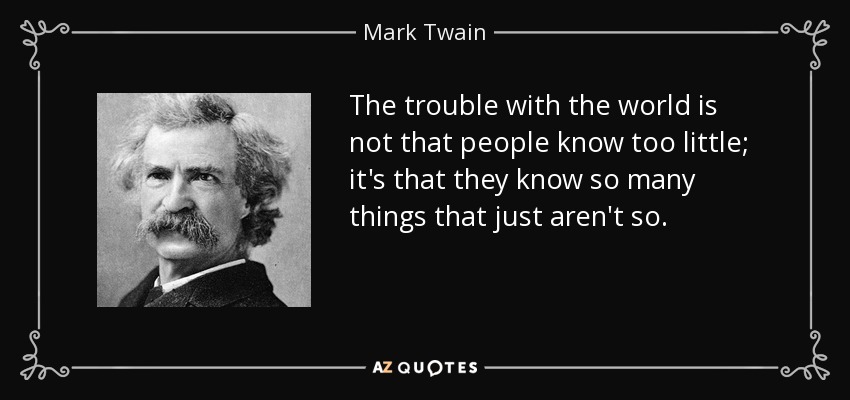
Downvoting a post can decrease pending rewards and make it less visible. Common reasons:
Submit